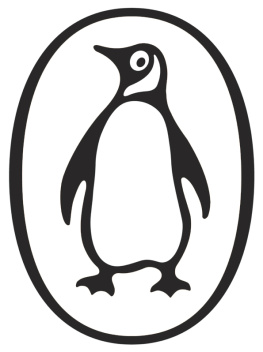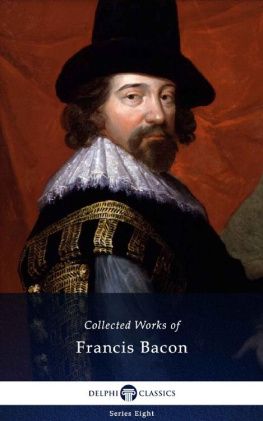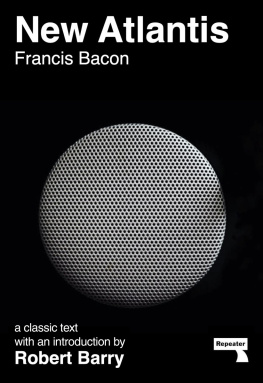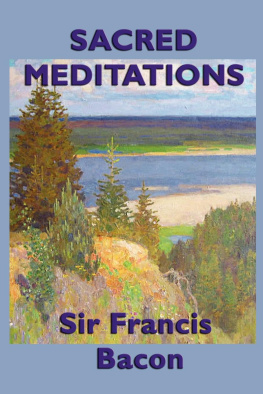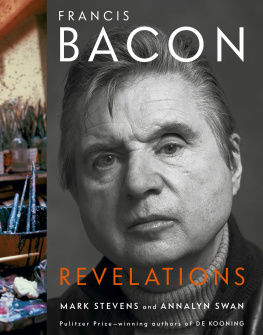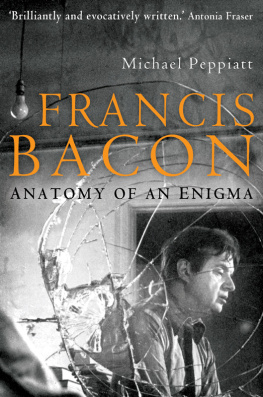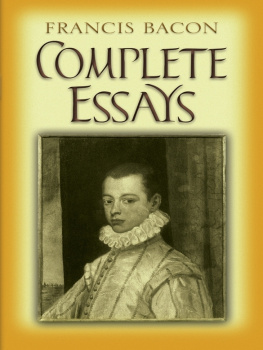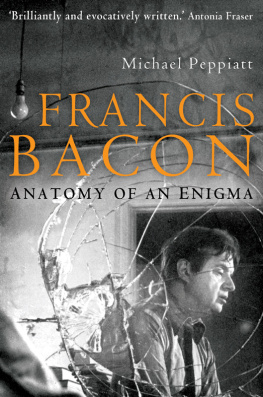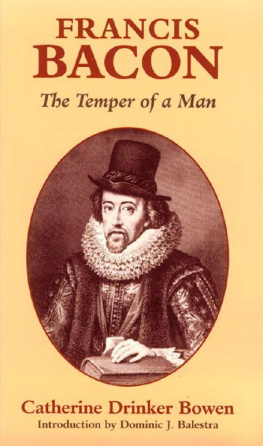Francis Bacon - The Essays
Here you can read online Francis Bacon - The Essays full text of the book (entire story) in english for free. Download pdf and epub, get meaning, cover and reviews about this ebook. year: 0, publisher: Penguin, genre: Art. Description of the work, (preface) as well as reviews are available. Best literature library LitArk.com created for fans of good reading and offers a wide selection of genres:
Romance novel
Science fiction
Adventure
Detective
Science
History
Home and family
Prose
Art
Politics
Computer
Non-fiction
Religion
Business
Children
Humor
Choose a favorite category and find really read worthwhile books. Enjoy immersion in the world of imagination, feel the emotions of the characters or learn something new for yourself, make an fascinating discovery.
- Book:The Essays
- Author:
- Publisher:Penguin
- Genre:
- Year:0
- Rating:3 / 5
- Favourites:Add to favourites
- Your mark:
- 60
- 1
- 2
- 3
- 4
- 5
The Essays: summary, description and annotation
We offer to read an annotation, description, summary or preface (depends on what the author of the book "The Essays" wrote himself). If you haven't found the necessary information about the book — write in the comments, we will try to find it.
The Essays — read online for free the complete book (whole text) full work
Below is the text of the book, divided by pages. System saving the place of the last page read, allows you to conveniently read the book "The Essays" online for free, without having to search again every time where you left off. Put a bookmark, and you can go to the page where you finished reading at any time.
Font size:
Interval:
Bookmark:

FRANCIS BACON: THE ESSAYS
FRANCIS BACON, philosopher, essayist, lawyer and statesman, was born in London in 1561. He studied at Cambridge and was enrolled at Grays Inn in 1576. In 1584 he entered Parliament as the member for Melcombe Regis, subsequently representing other constituencies. Bacon made the acquaintance of the Earl of Essex, who endeavoured to advance him in his career. Nevertheless, having been appointed to investigate the causes of Essexs revolt in 1601, Bacon was largely responsible for the earls conviction. Bacon was appointed Solicitor-General in 1607 and was successively Attorney-General (1613), Lord Keeper (1617) and Lord Chancellor (1618). He was created Baron Verulam in 1618 and Viscount St Albans in 1621. Later in that year he was charged with bribery and confessed that he had been guilty of corruption and neglect but denied that he had ever perverted justice. He was deprived of the Great Seal, fined, imprisoned in the Tower and disabled from sitting in Parliament. Following his release, he retired to the family home at Gorhambury, Hertfordshire, and his remaining years were spent in literary and philosophical work. It was Bacons ambition to create a new system of philosophy to replace that of Aristotle, and he has been justly acclaimed as an inspiration to later scientists, rationalists and materialists. Of his philosophical works, the principal and best known are The Advancement of Learning, Novum Organum and De Augmentis. He also wrote several professional works including Maxims of the Law and Reading on the Statute of Uses. Of his literary writings the most important are the Essays (1597; issued in final form in 1625), De Sapientia Veterum, Apophthegms New and Old and a History of Henry VII. Francis Bacon died in 1626.
JOHN PITCHER is Vice President of St Johns College, Oxford, and Visiting Research Professor at the University of Ulster at Coleraine. He is General Editor of the Penguin Renaissance Dramatists series.
FRANCIS BACON
EDITED
WITH AN
INTRODUCTION
BY
John Pitcher
PENGUIN BOOKS
PENGUIN BOOKS
Published by the Penguin Group
Penguin Books Ltd, 80 Strand, London WC2R 0RL, England
Penguin Putnam Inc., 375 Hudson Street, New York, New York 10014, USA
Penguin Books Australia Ltd, 250 Camberwell Road, Camberwell, Victoria 3124, Australia
Penguin Books Canada Ltd, 10 Alcorn Avenue, Toronto, Ontario, Canada M4V 3B2
Penguin Books India (P) Ltd, 11 Community Centre, Panchsheel Park, New Delhi 110 017, India
Penguin Books (NZ) Ltd, Cnr Rosedale and Airborne Roads, Albany, Auckland, New Zealand
Penguin Books (South Africa) (Pty) Ltd, 24 Sturdee Avenue, Rosebank 2196, South Africa
Penguin Books Ltd, Registered Offices: 80 Strand, London WC2R 0RL, England
www.penguin.com
First published 1985
Introduction and Notes copyright John Pitcher, 1985
All rights reserved
Printed in England by Clays Ltd, St Ives plc
Except in the United States of America, this book is sold subject to the condition that it shall not, by way of trade or otherwise, be lent, re-sold, hired out, or otherwise circulated without the publishers prior consent in any form of binding or cover other than that in which it is published and without a similar condition including this condition being imposed on the subsequent purchaser
EISBN: 9781101492451
CONTENTS
Bacons life, to adapt one of his own phrases, is a dark saying: concealed, reaching deeply within for its wisdom, and not a little dangerous. Even more, it is not yet expounded. It ought to be otherwise, if his long and considerable public career meant anything, for (as is not the case with so many Elizabethan writers) scores of his letters have survived, along with his personal papers, deeds, parliamentary reports, and accounts of his rise to and fall from great office. The documents fill seven volumes of the standard Victorian edition, besides the same number for his writings, literary, historical, scientific, philosophical and legal. Surely, of all the artists and writers who were lucky enough to begin their creative lives with one another in England in the 1590s, we should know most about Francis Bacon. Yet he still awaits his biographer, though many have told his life. Rather out of favour now, or simply more difficult to obtain, is the late-nineteenth-century life, Francis Bacon by E. A. Abbott. This is a well-written and well-documented study. Abbott can certainly be sniffy about the Jacobean court, and Bacons venial and cardinal sins, but his prejudices are evident, and he is not an unfair critic. The biography by C. D. Bowen (1963) is quite a good modern one. Other lives, political and scientific, are listed in the primer by Vickers (see below, p. ).
1561 Born, 22 January, at York House in the Strand, the son of Sir Nicholas Bacon, Lord Keeper of the Seal, and Anne Cooke (his second wife). Bacon was the youngest of eight children, six of whom were by Sir Nicholass first marriage.
1573 April. Goes up to Trinity College, Cambridge, with his elder brother, Anthony.
1576 June. Admitted to Grays Inn (again with Anthony).
September. Goes to Paris with Sir Amias Paulet, ambassador to France.
1579 February. His father dies, and (in June) he returns to England. Left with only a small inheritance, he is forced to seek a career in the law.
Anthony Bacon sets out on a long tour of the continent.
1582 June. Admitted Utter Barrister at Grays Inn.
1584 November. First appearance in Parliament, representing Melcombe Regis in Dorset. (He remains in the Commons, representing various constituencies, until 1618, when he is made a peer.)
c. 1585 Writes Advice to Queen Elizabeth, concerned chiefly with the recusants, and The Greatest Birth of Time.
1586 Becomes a Bencher of Grays Inn.
1592 Writes four speeches* for an entertainment, A Conference of Pleasure, celebrating Queen Elizabeths accession day. Anthony Bacon returns from abroad and notes that his brother is bound and in deep arrearages to Robert, Earl of Essex.
1593 In Parliament, speaks against a government proposal for subsidies, and as a consequence is forbidden to come into the Queens presence.
With support from Essex, he begins his (unsuccessful) petition for the offices of Attorney-, and then Solicitor-General.
1594 Writes six speeches* for the Grays Inn Christmas masque Gesta Grayorum. Begins to compile Formularies and Elegancies, a notebook of quotations and ideas; and writes legal and state pieces.
1595 Essex gives Bacon an estate (Twickenham) to console him on his failure to gain office.
Writes part of the device presented by Essex to celebrate the Queens accession day (Of Love and Self-Love).
1596 Advises Fulke Greville on his studies and the Earl of Rutland on his travels.
1597 Publishes the Essays,* with Colours of Good and Evil and Meditationes Sacrae. Writes Maxims of the Law.
Proposes marriage to Lady Hatton, who refuses and then marries his rival and enemy, Sir Edward Coke.
1598 Arrested for debt, but soon released.
Writes a pamphlet about a Jesuit conspiracy against the Queen.
1600 June. Takes part in proceedings against Essex after the Irish dbcle (in which the Earl, close to defeat by the Irish, abandoned his command and returned to England without the Queens permission).
July. Offers his services to Essex, a fortnight after the Earl has been released but not restored to the Queens favour.
Font size:
Interval:
Bookmark:
Similar books «The Essays»
Look at similar books to The Essays. We have selected literature similar in name and meaning in the hope of providing readers with more options to find new, interesting, not yet read works.
Discussion, reviews of the book The Essays and just readers' own opinions. Leave your comments, write what you think about the work, its meaning or the main characters. Specify what exactly you liked and what you didn't like, and why you think so.

